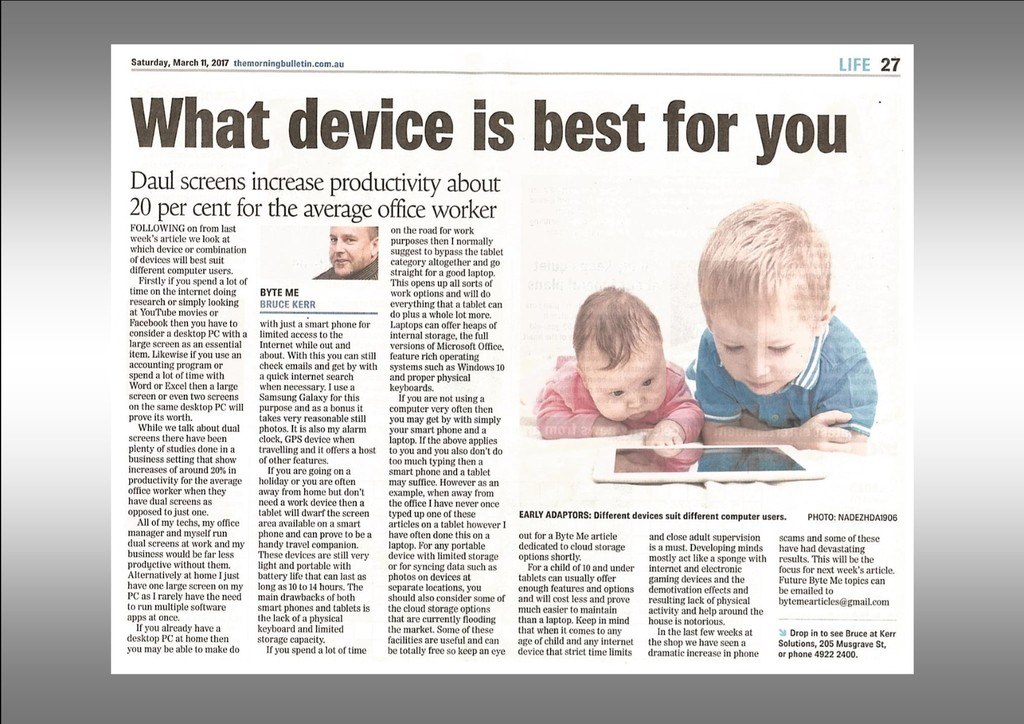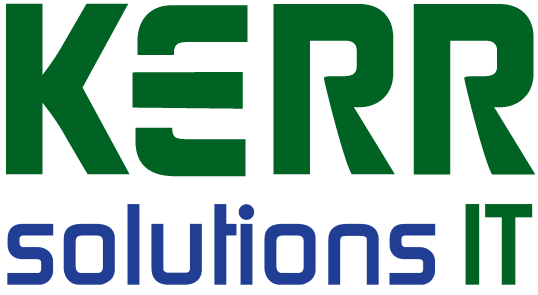11th March 2017
What Device is Best For You
Following on from last week’s article we look at which device or combination of devices will best suit different computer users. Firstly if you spend a lot of time on the Internet doing research or simply looking at YouTube movies or Facebook then you have to consider a desktop PC with a large screen as an essential item. Likewise if you use an accounting program or spend a lot of time with Word or Excel then a large screen or even two screens on the same desktop PC will prove its worth.
While we talk about dual screens there have been plenty of studies done in a business setting that show increases of around 20% in productivity for the average office worker when they have dual screens as opposed to just one. All of my techs, my office manager and myself run dual screens at work and my business would be far less productive without them. Alternatively at home I just have one large screen on my PC as I rarely have the need to run multiple software apps at once.
If already have a desktop PC at home then you may be able to make do with just a smart phone for limited access to the Internet while out and about. With this you can still check emails and get by with a quick Internet search when necessary. I use a Samsung Galaxy for this purpose and as a bonus it takes very reasonable still photos. It is also my alarm clock, GPS device when travelling and it offers a host of other features.

If you are going on a holiday or you are often away from home but don’t need a work device then a tablet will dwarf the screen area available on a smart phone and can prove to be a handy travel companion. These devices are still very light and portable with battery life that can last as long as 10 to 14 hours. The main drawbacks of both smart phones and tablets is the lack of a physical keyboard and limited storage capacity.
If you spend a lot of time on the road for work purposes then I normally suggest to bypass the tablet category altogether and go straight for a good laptop. This opens up all sorts of work options and will do everything that a tablet can do plus a whole lot more. Laptops can offer heaps of internal storage, the full versions of Microsoft Office, feature rich operating systems such as Windows 10 and proper physical keyboards.
If you are not using a computer very often then you may get by with simply your smart phone and a laptop. If the above applies to you and you also don’t do too much typing then a smart phone and a tablet may suffice. However as an example, when away from the office I have never once typed up one of these articles on a tablet however I have often done this on a laptop.
For any portable device with limited storage or for syncing data such as photos on devices at separate locations, you should also consider some of the cloud storage options that are currently flooding the market. Some of these facilities are usefully and can be totally free so keep an eye out for a Byte Me article dedicated to cloud storage options shortly.
For a child of 10 and under tablets can usually offer enough features and options and will cost less and prove much easier to maintain than a laptop. Keep in mind that when it comes to any age of child and any Internet device that strict time limits and close adult supervision is a must. Developing minds mostly act like a sponge with Internet and electronic gaming devices and the demotivation effects and resulting lack of physical activity and help around the house is notorious.
In the last few weeks at the shop we have seen a dramatic increase in phone scams and some of these have had devastating results. This will be the focus for next week’s article.
Future Byte Me topics can be emailed to [email protected] and Bruce is contactable at Kerr Solutions, 205 Musgrave Street or on 49 222 400.
For more advice and assistance from Kerr Solutions, like and follow us on Facebook
